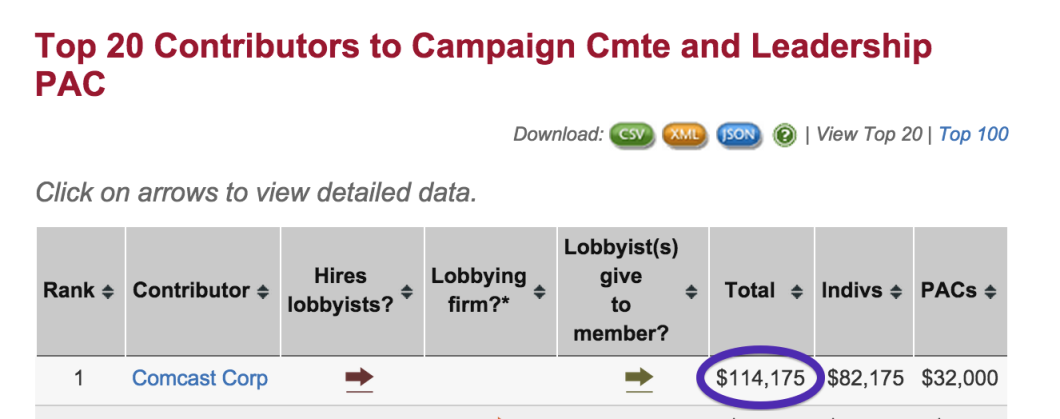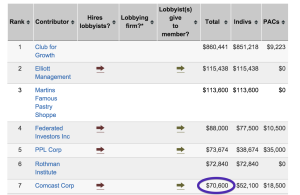Here’s What $184K In Campaign Contributions Gets Comcast — A Letter Of Support From Two Senators

According to OpenSecrets.org, Casey’s campaign and leadership PAC took in more than $114,000 from Comcast during the 2014 election cycle alone. The cable colossus was the Pennsylvania Senator’s top contributor.
Senators Pat Toomey, whose campaign hauled in $70,600 in contributions from Comcast and its employees this election cycle, and Bob Casey, who really felt the love from Comcast’s $114,000 in combined contributions in 2014, penned a joint letter to FCC Chair Tom Wheeler today, urging him to hurry up and approve this merger already.
Their reasons? Because Comcast informed them that it’s a good deal.
“Comcast has informed us that the merger will provide improved Internet access with no corresponding decrease in competition,” reads the letter, which doesn’t question the source of that information or mention that Comcast was the single largest donor to Casey’s campaign. “The public should not have to wait for these benefits. Accordingly, we urge you to approve the merger as soon as possible.”
Oh, but the good lawmakers aren’t done parroting what their Philadelphia-based benefactor has told them about the merger.
“Comcast has informed us that the proposed merger will produce substantial benefits for the public,” continues the letter, without explaining what those benefits are, “and that the company has acted proactively to prevent anti-competitive effects. There is no geographic overlap between Comcast and Time Warner, so no consumer will lose a choice among providers.”

Comcast was only the seventh-largest contributor to Toomey’s campaign fund and leadership PAC, but still gave more than $70K in 2014. Click image to read.
Toomey should actually know this, since he currently lives in Zionsville, PA, which is not in the current footprint of Comcast and won’t ever be unless Comcast decides to buy up the small regional provider who controls pay-TV service in the area.
Perhaps that’s why he’s relying so much on things that Comcast has “informed” him about rather than taking a few minutes to do his own research.
And if we may just call shenanigans on the concluding points of the Senators’ letter, which doesn’t cite Comcast as the source, but which makes statements that neither Toomey nor Casey can back up.
It says the merger will benefit “workers through additional jobs,” but doesn’t explain how that’s possible, given that the whole notion of the merger is to cut down on Comcast’s marginal costs. There is no way on Earth that a combined Comcast/TWC — especially one that sheds 3 million customers to placate regulators — will maintain the same number of customer service and billing staff. Additionally, there will inevitably be jobs lost or eliminated through attrition as Comcast consolidates its broadcasting and broadband operations.
The senators claim that the merger will benefit “millions of consumers through faster Internet speeds,” but doesn’t show any evidence that Comcast actually wants to provide faster speeds for consumers. In fact, Comcast is actively testing out broadband caps, implying that it wants to limit the amount of data its subscribers use.
Then it argues, again without any evidence, that the public at large will benefit from the expansion of Comcast Internet Essentials, a program — largely derided as window-dressing to appease regulators — aimed at giving broadband access to certain low-income families. But Comcast, years into the rollout of Essentials, has by its own admission only signed up 350,000 households, a fraction of the more than 20 million customers it has around the country.
The Comcast merger is only a good deal for Comcast investors and the Time Warner Cable executives who stand to get paid a ton of money for running a mediocre company, like CEO Rob Marcus, who personally stands to rake in upwards of $80 million, even though he’s really been a lame duck for his entire tenure on the job.
In fact, it might be better for lawmakers to quietly do what they can to make sure this merger fails. That way, they can score some big contributions from Charter when it then tries to take over TWC.
Want more consumer news? Visit our parent organization, Consumer Reports, for the latest on scams, recalls, and other consumer issues.

